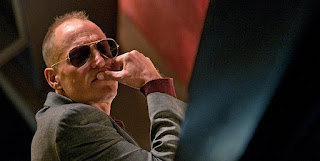 The opening credits of Aki Kaurismäki's "Le Havre" give prominent billing to Laika, a dog playing herself, and promise the appearance of a sixtysomething French blues-rocker by the name of Little Bob. This gives a good idea of the tone of the optimistic, understated confection that will follow.
The opening credits of Aki Kaurismäki's "Le Havre" give prominent billing to Laika, a dog playing herself, and promise the appearance of a sixtysomething French blues-rocker by the name of Little Bob. This gives a good idea of the tone of the optimistic, understated confection that will follow.Marcel (André Wilms) describes himself as a former Paris bohemian and artist. But now he is a sixty-year-old shoe-shiner, living by the sea in Le Havre with his wife Arletty (Kati Outinen). His neighborhood, and the film, seem to have skipped at least three decades, buildings, furnishings, stores, clothes and cars all of at least 1970s vintage. There are no young people here - the population of Marcel's neighborhood are like him, quietly and contentedly departing middle-age.
The quiet town is roused by the discovery at the port of a shipping container containing a couple of dozen Gabonese emigrants. The container was supposed to end up in London but has landed in Le Havre. All but one of the people inside are detained: a boy, Idrissa (Blondin Miguel), runs away. By chance, while hiding from a police force led by the marvelously deadpan Monet (Jean-Pierre Darroussin), he crosses paths at the dock with Marcel, who offers him food and later returns to leave more food and cash.
At the same time as Idrissa enters the lives of Marcel and his neighbors, Arletty leaves. She is hospitalized with severe illness, and the outlook is not good. "Miracles do happen," is all that her doctor can offer; "not in my neighborhood," she replies. This is by a large margin as pessimistic and reflective as anyone will get in this story of simple, pragmatic kindness. Arletty languishes as Marcel and his neighbors, without complicated plotting or discussion, undertake without fanfare to perform a miracle and get Idrissa to London, where his mother awaits him, before he is caught.
What is the nature of the mirror between Arletty and Idrissa? We see Marcel tender and concerned, journeying daily to his wife's decidedly not modern hospital room, but she sends him away, not wanting to be seen ravaged by her treatment, keeping the extent of her illness from him. She seems almost to be playing the role of a guiding angel for Idrissa, having been displaced by him and now granting her husband the time to help him. But as Marcel protects Idrissa and figures out how and where to send him onward, he cannot be there for his wife as her condition seems to grow more dire. If he succeeds with Idrissa, what about his wife? Are Arletty and Idrissa's fates linked or opposite?
For a plot that is ostensibly cat-and-mouse, "Le Havre" proceeds with little urgency or suspense. Things unfold in the order and at the pace that they are capable of, and anything modern or insistent seems malignant. One of the armed police who accompany Monet to the dock when Idrissa runs away point automatic weapons at the fleeing child; Monet is incredulous and pushes the weapons aside. Later a commuter uses an anachronistic-seeming mobile phone to summon the police when he spots Idrissa; one of the neighborhood intervenes to allow Idrissa to escape before the police arrive. Time is slow here, and this kind of thing has no place.
Time cannot trouble Marcel and his neighbors, and neither are they ever bothered by doubt. They make no trade-off between what is right and what is possible, which at first makes the whole down-to-earth business of the plot seem utterly unreal. Everyone is defined entirely by their actions, and their actions are matter-of-fact - a child is here, he wants to get there, and that's just the way it is. There is almost no antagonism, because almost no-one does anything wrong. "Le Harve" is as optimistic and compassionate a film as I can remember, but the optimism and compassion are just the boxes that the simple actions of Marcel and his friends naturally fall into. This is an alluring escapism, so that by the end the whole fantasy seemed to make all the sense in the world.
Links: IMDb, Metacritic











(poster)Shame_poster.jpg)
